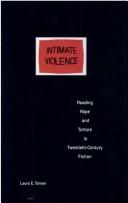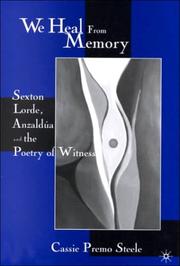| Listing 1 - 4 of 4 |
Sort by
|
Book
ISBN: 9789004437432 9004437436 9004437444 9789004437449 Year: 2021 Publisher: Leiden, The Netherlands : Koninklijke Brill NV,
Abstract | Keywords | Export | Availability | Bookmark
 Loading...
Loading...Choose an application
- Reference Manager
- EndNote
- RefWorks (Direct export to RefWorks)
In this ground-breaking study, Sabine Binder analyses the complex ways in which female crime fictional victims, detectives and perpetrators in South African crime fiction resonate with widespread and persistent real crimes against women in post-apartheid South Africa. Drawing on a wide range of crime novels written over the last decade, Binder emphasises the genre’s feminist potential and critically maps its political work at the intersection of gender and race. Her study challenges the perception of crime fiction as a trivial genre and shows how, in South Africa at least, it provides a vibrant platform for social, cultural and ethical debates, exposing violence, misogyny and racism and shedding light on the problematics of law and justice for women faced with crime. Readership: All interested in crime fiction and its gender/racial political potential, its cultural relevance, its ethics and aesthetics, in South Africa and beyond.
Detective and mystery stories, South African (English) --- Women in literature --- Victims of crimes in literature --- Female offenders in literature --- Women detectives in literature --- Woman (Christian theology) in literature --- Women in drama --- Women in poetry --- Detective and mystery stories, English --- South African detective stories (English) --- South African mystery stories (English) --- South African fiction (English) --- History and criticism --- Female offenders in literature. --- Victims of crimes in literature. --- Women detectives in literature. --- Literary studies: fiction, novelists & prose writers --- History and criticism.
Book
ISBN: 9781441156112 1441156119 1472542428 1441170057 1441120327 9781441170057 9781441120328 9781623563547 9781472542427 1623563542 9781623563547 Year: 2011 Publisher: New York Continuum
Abstract | Keywords | Export | Availability | Bookmark
 Loading...
Loading...Choose an application
- Reference Manager
- EndNote
- RefWorks (Direct export to RefWorks)
Exiles, Outcasts, Strangers explores how nine different "outsider" authors treat the theme of alienation in one of their major works. All the novels under review were written in a limited time span (1942 to 1987, approximately 50 years), and all are structured around a hero or heroine who remains culturally, ethically or aesthetically distant from his/her narrative counterparts. Works discussed: Albert Camus' L'Etranger; Richard Wright's The Outsider; André Langevin's Poussière sur la ville; Ernesto Sábato's El túnel; V.S. Naipaul's Guerrillas; Elie Wiesel's Le Cinquième fils; Norbert Zongo's Le Parachutage; Gisèle Pineau's L'Exil selon Julia, and Jean Genet's Querelle de Brest
Marginality, Social, in literature. --- Fiction --- Exiles in literature. --- Strangers in literature. --- Alienation (Social psychology) in literature. --- Victims of crimes in literature. --- Minorities in literature. --- History and criticism. --- Fiction -- 20th century -- History and criticism. --- Marginality, Social, in literature --- Exiles in literature --- Strangers in literature --- Alienation (Social psychology) in literature --- Victims of crimes in literature --- Minorities in literature --- Languages & Literatures --- Literature - General --- History and criticism --- Minorities as a theme in literature --- Marginalité --- Exil --- Etrangers --- Aliénation sociale --- Minorités --- Dans la littérature --- Marginalité --- Aliénation sociale --- Minorités --- Dans la littérature

ISBN: 0585019541 9780585019543 0253356482 9780253356482 Year: 1994 Publisher: Bloomington : Indiana University Press,
Abstract | Keywords | Export | Availability | Bookmark
 Loading...
Loading...Choose an application
- Reference Manager
- EndNote
- RefWorks (Direct export to RefWorks)
Human body in literature. --- American fiction --- English fiction --- Victims of crimes in literature. --- Reader-response criticism. --- Violence in literature. --- Torture in literature. --- Women in literature. --- Rape in literature. --- Women and literature --- Rape in literature --- Victims of crimes in literature --- Human body in literature --- Reader-response criticism --- Violence in literature --- Torture in literature --- Women in literature --- English --- Languages & Literatures --- American Literature --- Woman (Christian theology) in literature --- Women in drama --- Women in poetry --- Reader-oriented criticism --- Reception aesthetics --- Criticism --- Reading --- Body, Human, in literature --- Human figure in literature --- Literature --- American literature --- History and criticism. --- History and criticism --- 20th century --- Body [Human ] in literature --- Crime in literature --- Women and literature.

ISBN: 0312233426 Year: 2000 Publisher: New York (N.Y.) : Palgrave,
Abstract | Keywords | Export | Availability | Bookmark
 Loading...
Loading...Choose an application
- Reference Manager
- EndNote
- RefWorks (Direct export to RefWorks)
Through an examination of the poetry of Anne Sexton, Audre Lorde, and Gloria Anzaldúa,'We Heal From Memory' paints a vivid picture of how our culture carries a history of traumatic violence--child sexual abuse, the ownership and enforcement of women's sexuality under slavery, the transmission of violence through generations, and the destruction of non-white cultures and their histories through colonization. According to Cassie Premo Steele, the poetry of Sexton, Lorde, and Anzaldúa allows us to witness and to heal from such disparate traumatic events.
American poetry --- Healing in literature. --- Memory in literature. --- Victims in literature. --- Victims of crimes in literature. --- Violence in literature. --- Witnesses in literature. --- Women and literature --- Women in literature. --- Women authors --- History and criticism. --- History --- Anzaldua, Gloria --- Lorde, Audre --- Sexton, Anne, --- Criticism and interpretation.
| Listing 1 - 4 of 4 |
Sort by
|

 Search
Search Feedback
Feedback About UniCat
About UniCat  Help
Help News
News